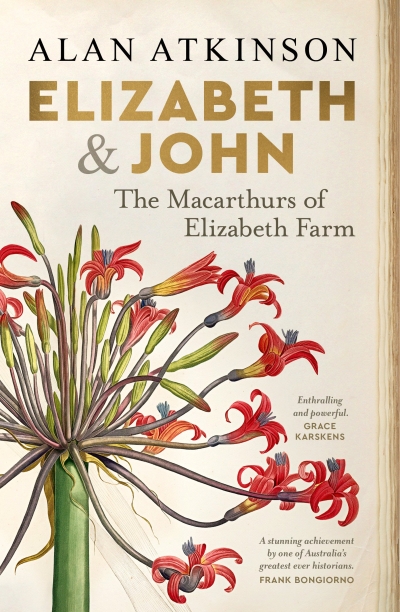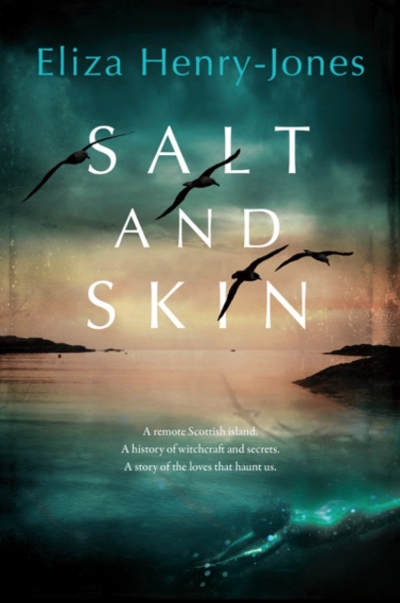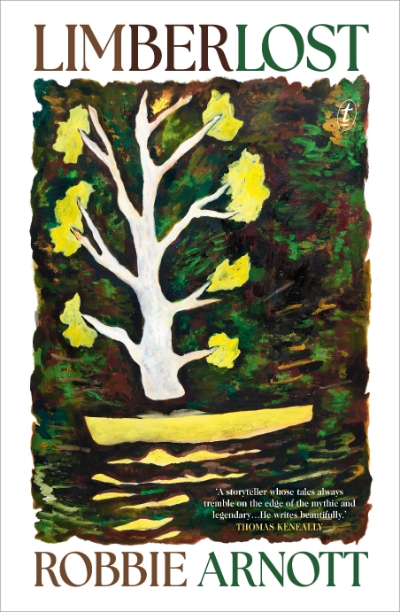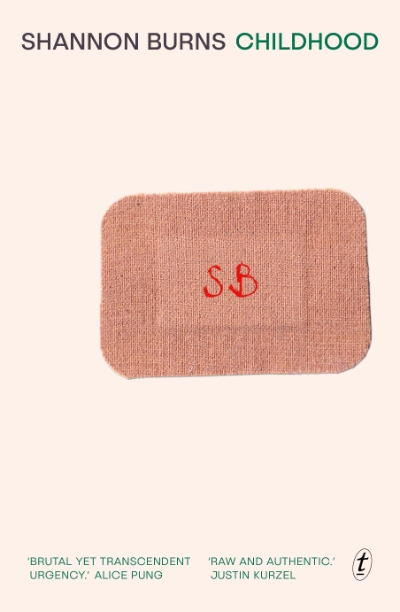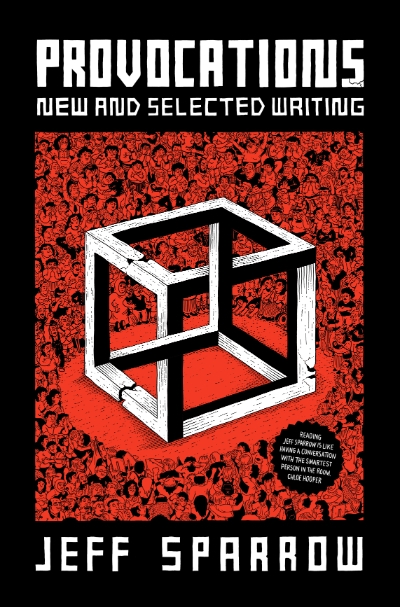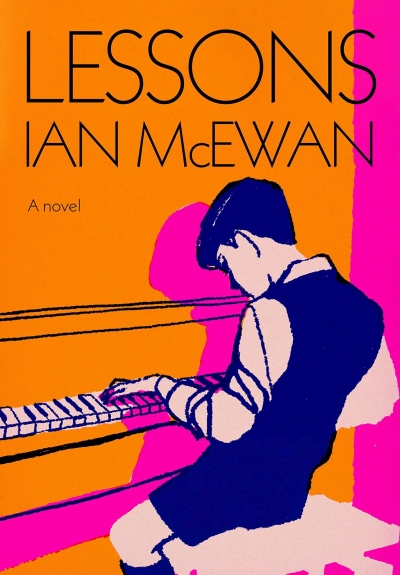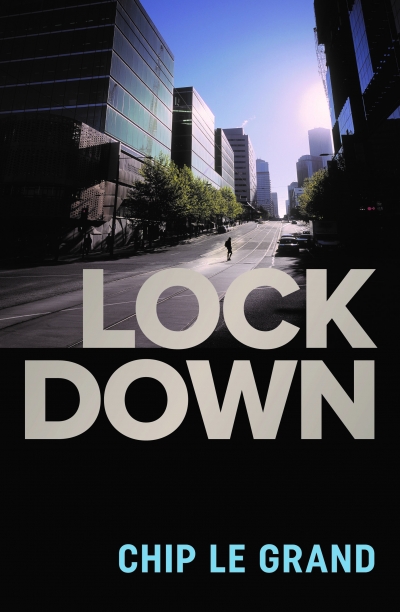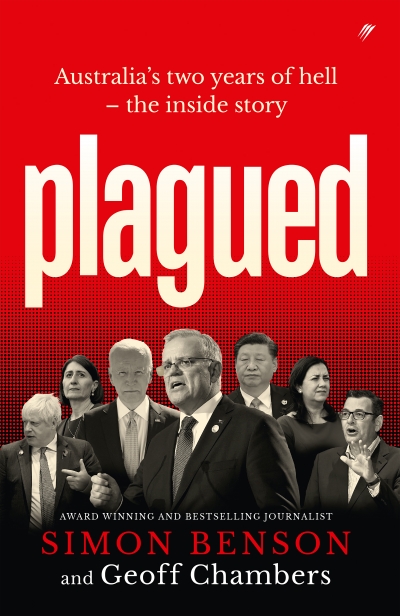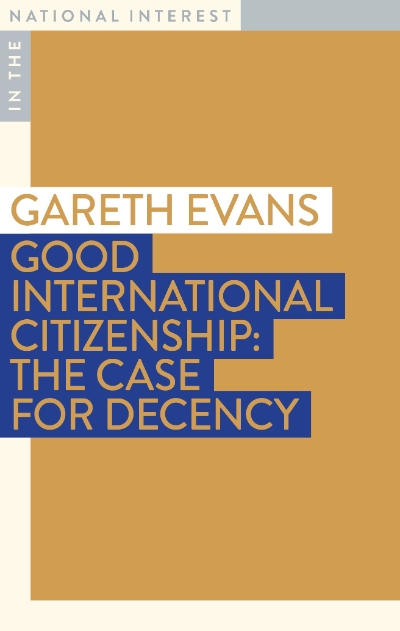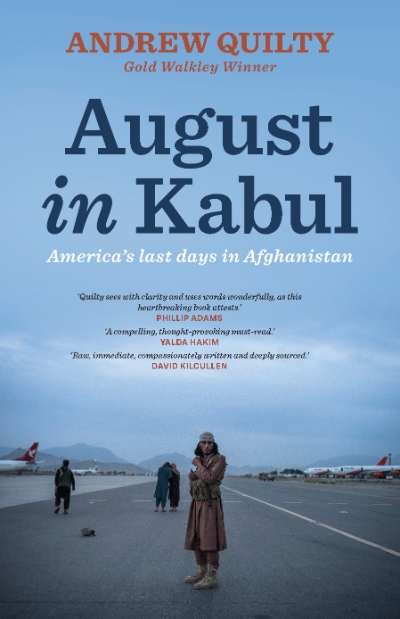Book of the Week
Sign up to Book of the Week and receive a new review to your inbox every Monday. Always free to read.
Recent:
Elizabeth and John: The Macarthurs of Elizabeth Farm by Alan Atkinson
'If we take it for granted that John Macarthur was a bad man,’ writes Alan Atkinson, ‘then all the surviving evidence takes on a colouring to match. If we think that, then every word he wrote is suspect. On the other hand, leave the question of character open and the evidence takes on a new richness altogether – a deeper and more complex humanity. That is what I aim to do in this book.’
... (read more)Salt and Skin is the fifth novel by Victorian-based writer Eliza Henry-Jones. Following the death of her husband, Luda moves with her two teenage children, Darcy and Min, from Australia to the remote Scottish islands. Luda, a photographer, is employed by the local council to document the effects of climate change on the islands and to raise funds for related activism. They will live on Seannay, a small tidal island off the main Big Island, in the isolated and ramshackle ‘ghost house’ that bears centuries-old markings on the ceilings, ‘witch marks’ thought to ward off evil.
... (read more)Limberlost opens with an image of nature as dangerous: a whale, reportedly driven mad or feral by a harpoon in its side, is alleged to be destroying fishing boats in a vengeful spree. Ned is five, and the whale stories haunt him so much that his father takes him out to see for himself. The frightened child waits in a small boat for the animal’s power to show itself.
... (read more)That the boy depicted in Shannon Burns’s nightmarish memoir survived to write it at the age of forty reflects no credit on society or on those around him. His persistence seems remarkable, given the world he entered.
... (read more)In the late nineteenth and early twentieth centuries, a number of cycling groups in Europe were founded on socialist principles. I had some notion, before reading Jeff Sparrow’s Provocations, of the link between cycling and that era’s feminist politics – the independent, bloomer-clad woman on her bicycle, which Sparrow also sketches – but not of Italy’s Ciclisti Rossi (Red Cyclists) or England’s Clarion Cycling Club. The latter’s anthem celebrated its members’ two-wheeled role in advancing class struggle.
... (read more)John Updike said of his most enduring creation, Harry ‘Rabbit’ Angstrom, that he was a version of the author who never went to college. Roland Baine, protagonist of Lessons, is something similar: a McEwan that failed. He’s a man whose early gifts aren’t brought to fruition. His closest brush with literary fame is brief: early marriage to a woman who becomes the kind of artist he could never be. Roland does not possess the requisite ruthless ambition; he lacks the splinter of ice in the heart. He’s a sensualist by inclination and passive by nature – a born helpmeet and second stringer who cobbles together a working life as a lounge-bar pianist and part-time tennis instructor.
... (read more)For many of us, the long Melbourne lockdowns of 2020 and 2021 were emotionally ambiguous affairs. Feelings ranged from anger over the deprival of basic freedoms and hope and despair over daily case numbers, to relief at being forced to stay at home, Zoom into work in our pyjamas and dispense with the daily commute. Some of us discovered our neighbourhoods for the first time or new interest we could cultivate, such as baking sourdough bread or gardening. That said, we probably don’t want to revisit the experience anytime soon. But we should, argues Chip Le Grand in his new book, because while Melbourne’s ‘status as the world’s most locked-down city should be cause for neither pride nor shame’, it should not be forgotten. Beginning with a vivid account of the ‘unlawful’ lockdown of housing commission towers in Melbourne’s inner north, Le Grand asks: ‘How did a city like Melbourne arrive at a place where we would strip people of all agency, and finally, their dignity, in the name of public health?’ This book is an account of how this happened.
... (read more)Plagued: Australia’s two years of hell – the inside story by Simon Benson and Geoff Chambers
Scott Morrison needn’t waste time writing a political memoir: the work of self-vindication has already been attempted on his behalf by Simon Benson and Geoff Chambers, both columnists at The Australian, in their now highly controversial book Plagued: Australia’s two years of hell – the inside story. Theirs is a largely heroic story about Morrison’s leadership, which ‘served the nation well’ amid a ‘most extreme period of adversity’.
... (read more)Good International Citizenship: The case for decency by Gareth Evans
Over the course of a long and distinguished public life, Gareth Evans has held fast to his conviction that as individuals aspire to personal decency and moral behaviour, the same should be replicated among nations. As a foreign minister and an author, and in his international organisations and academic roles, Evans has consistently advocated ‘good international citizenship’. Care for our common humanity he sees as both a moral imperative and a national interest.
... (read more)August in Kabul: America’s last days in Afghanistan by Andrew Quilty
This book will at times quite literally take your breath away. A deeply reported account of the fall of Afghanistan’s capital, August in Kabul tells the harrowing stories of those who escaped and those who were left behind in the maelstrom of those two weeks between the arrival of the Taliban on 15 August 2021 and the final US flight to depart – at one minute to midnight on 30 August. Compelling, vivid, and distressing all at once, it is a damning indictment of the Taliban’s wanton cruelty and of the domestic and foreign policy failures that allowed them to return. It is an impressive book-length début by one of Australia’s pre-eminent photojournalists.
... (read more)

